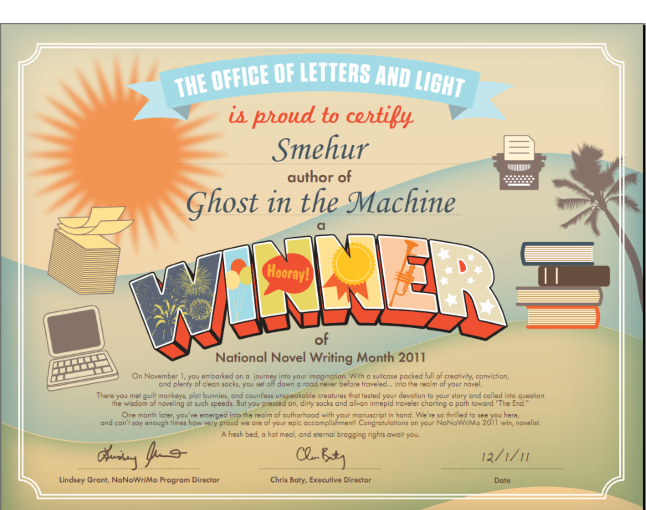Smehur gave birth to Ghost in the Machine which quickly turned out to be a child with special needs. And while Smehur loves its offspring very much, for Smehur has wanted to tell this story since day one, Smehur is starting to feel the weight of its own numerous inadequacies.
Author: Smehur
Freud, Interpreting Dreams
Dreams were the ideal vehicle for this project: universal experiences with a history of fascination expressed in popular and esoteric literature, but with clear links to the extreme states of insanity and everyday abnormality.
John Forrester (Introduction)
Wrote a Novel in a Month
A couple of weeks ago I wrote about taking the plunge and participating in NaNoWriMo 2011, and then, a couple of days ago, about finishing a 63000-word rough-draft for a novel in a month, averaging at over 2000 words per day. It’s not really over, though.
Flaubert, Madame Bovary
The noblest instincts, the purest sympathies, are reviled and persecuted, and if ever two poor souls do meet, then everything is organized to prevent their union.
For his pleasures had so trampled over his heart, like schoolboys in a playground, that no green thing grew there, and whatever passed that way, being more frivolous than children, left not so much as its name carved on the wall.
NaNo is over… and I made it!
There were many moments when I thought I didn’t have it in me. But I kept at it… and I made it! I finished the rough draft for “Ghost in the Machine” at about 63000 words yesterday evening. It’s been an amazing month. I’m almost sad that it’s over.
A quick run-down: “Ghost in the Machine” is a Mass Effect AU in which Nihlus doesn’t die on Eden Prime. It came out comfortably T-rated, and I hope, quite plausible. Summary & excerpt here!
Not going to lie: more than a few chapters are crap, because I had to force myself to write things I didn’t want to write in order to get to those I did want to write, and since I started out with nothing but the broadest idea possible, I had to make plans as I went. There was no time to go back and fix things, even after I’ve gotten deep into the mindset and started generating fix-ideas like crazy. But the closer I was to the end, the less cringing I had to do.
So now I need to rip it apart edit, a lot, make some additions, make some decisions… like, do I want to write a sequel, eventually? And then I’ll post on FFN, hoping it will be as fun for others to read as it’s been for me to write.
Quote: Nordom from Planescape Torment
I think, therefore I am. I think.


